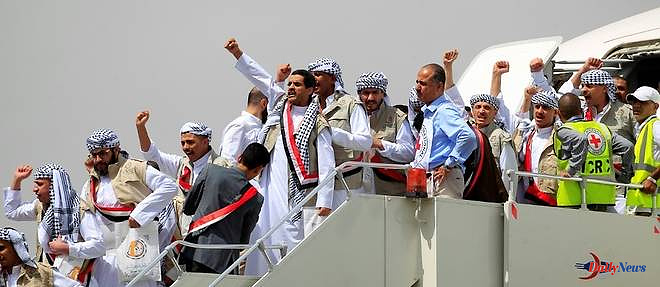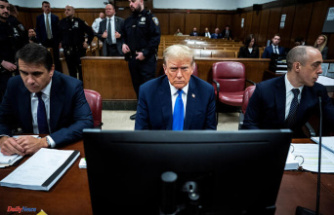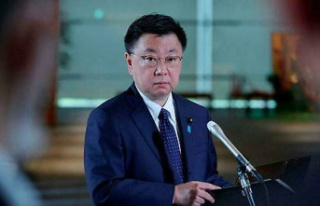Hundreds of war detainees in Yemen, including Saudis, were freed on Saturday in the second day of a massive prisoner swap between rebels and the government, backed by a Saudi-led military coalition.
The exchange, which began on Friday, comes amid a warming between Saudi Arabia and Iran, which supports the Houthi rebels, and amid talks aimed at ending more than eight years of conflict in Yemen , the poorest country in the Arabian Peninsula.
A plane carrying 120 Houthi detainees landed in the insurgent-held Yemeni capital Sanaa on Saturday from the southern Saudi city of Abha, according to the International Committee of the Red Cross (ICRC).
Another, with 117 Houthi detainees on board, took off a little later from Abha bound for the Yemeni capital, according to the ICRC.
"I finally find the taste of freedom," said ex-convict Abdallah Hashem on his arrival in Sanaa after seven years in a Saudi prison.
"I hope all the prisoners will be reunited with their families," he added, hugging his mother.
In parallel, a plane carrying 16 Saudis and three Sudanese, members of the coalition, arrived in the Saudi capital Riyadh.
The brother and son of one of the members of the Yemeni Presidential Council, Tarek Saleh, were also on board, according to the Saudi channel, Al-Ekhbariya.
"This exchange is of very great importance for the political and military leaders of the coalition who want to close the prisoner file and recover all the detainees," said coalition spokesman Turki al-Maliki, quoted by the official Saudi agency, SPA.
The total number of prisoners of war in Yemen has never been disclosed.
Three other flights were scheduled for Saturday, between the Yemeni cities of Mokha (south) and Sanaa, transporting a hundred prisoners.
In all, nearly 900 detainees were to be released over three days, in accordance with an agreement reached in early March in Switzerland between the Yemeni government and the rebels.
The prisoner exchange is "a trust-building mechanism between the two sides. We hope it represents a step in broader efforts that will eventually lead to peace," the ICRC regional director told AFP. for the Gulf, Mamadou Sow.
As of Friday, 318 prisoners, including Yemen's former defense minister and the former president's brother, had been transported between government-controlled Aden and Sanaa, which has been held by the Houthis for more than eight years.
The war in Yemen has caused one of the worst humanitarian crises in the world, with hundreds of thousands dead and millions displaced, in a context of epidemics, lack of drinking water and acute hunger. More than three quarters of the population depend on international aid, which nevertheless continues to decline.
The fighting has largely ceased since the United Nations brokered a truce a year ago, although that officially ended in October.
Last week, a Saudi delegation traveled to Sanaa for talks aimed at reviving the truce and laying the groundwork for a more durable ceasefire.
The delegation left Thursday after "positive" discussions, the Saudi Foreign Ministry said in a statement on Saturday. The talks "will continue as soon as possible in order to reach a comprehensive political solution", he added.
This vast prisoner exchange operation, the largest since the release of more than 1,000 prisoners in October 2020, is part of a context of regional appeasement.
The two great powers, Saudi Arabia and Iran, concluded in March an agreement, negotiated under the aegis of China, with a view to resuming their relations after seven years of rupture, likely to change the game. regional.
According to Sanam Vakil, director of the Middle East and North Africa program at Chatham House, Riyadh is seeking to "limit its military involvement in Yemen" and achieve a "sustainable long-term peace that would allow it to focus on its economic priorities". .
But the rich oil monarchy will long remain "the intermediary, the investor and the guarantor of the conflict in Yemen", she underlines.
15/04/2023 16:35:04 - Sanaa (AFP) © 2023 AFP












